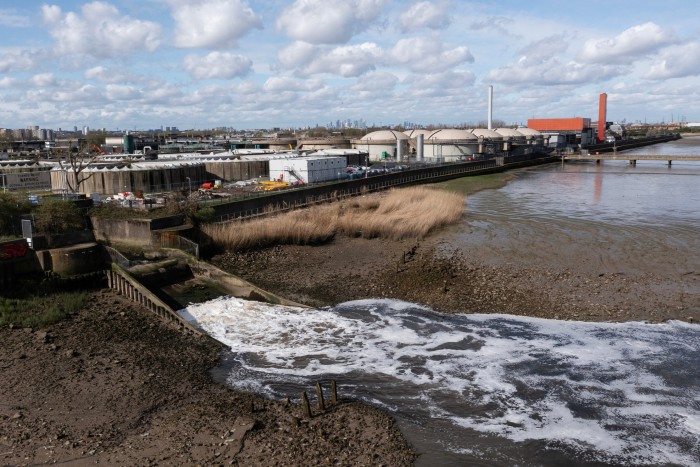Unlock the Editor’s Digest for free
Roula Khalaf, Editor of the FT, selects her favourite stories in this weekly newsletter.
Ministers have accepted that Thames Water bills will have to rise, as they seek to persuade investors to put more money into the troubled company and stop it sliding towards a politically disastrous nationalisation.
Steve Barclay, the environment secretary, has told the company and the regulator, Ofwat, that he does not want to see any relaxation of the regulatory regime that would allow Thames Water to eject more sewage into rivers.
But ministers admit that something has to give to stop investors walking away from the company after Thames Water shareholders this week ruled out injecting £500mn of equity.
“We are not overjoyed about bills rising,” said one government insider close to the discussions with Ofwat and Thames Water. “But if you have to give somewhere, it would have to be on bills.”
Thames Water has asked to be allowed to raise bills by 56 per cent by 2030, including inflation — or around £262 per household. But the Consumer Council for Water (CCW) has warned that the increases will be unaffordable for many households and there is a growing campaign calling for non-payment of bills.
“Thames Water customers understand that investment is needed but they should not have to pay for Thames Water’s past failures. They’ve already paid a high price through the companies’ poor complaints record and service levels,” said Mike Keil, chief executive of the CCW.
Ofwat is in the process of weighing its decision, with a draft ruling expected in June when the company is expected to renew efforts to draw in billions of pounds of equity from new and existing shareholders. The company needs the bill increases to underpin any shareholder investment.
While Barclay accepts that customers already feel they are paying too much for water, there is also widespread anger over the state of Britain’s waterways; the Liberal Democrats are putting the campaign against sewage spills at the heart of their election campaign.
The issue will come into renewed focus on Saturday when the Oxford-Cambridge Boat Race takes place despite warnings of “dangerous” pollution caused by sewage in the river Thames.
Barclay met the new Thames Water management earlier this month and is said by colleagues to want to give them a chance to turn things around. “They seem to have a plan for doing it,” said one government official.
Prime Minister Rishi Sunak’s business adviser Franck Petitgas has been involved in discussions to find a way out of the crisis at Thames Water, as Downing Street joins the effort to try to stop the company failing.
Thames Water is also asking for limits to regulatory fines for sewage pollution and other failings, as the company claims they deplete cash from the business, making it harder to turn around its performance.
Two directors, including company secretary Rachael Hambrook, quit parent company Kemble on Thursday in a sign of the water monopoly’s growing distress.
Chris Weston, Thames Water’s chief executive, said this week the company was “a long way off” temporary nationalisation, but did not rule it out, presenting a major problem for Sunak in an election year.
Margaret Thatcher privatised the water sector in the 1980s and the forced renationalisation of Thames Water would confirm in the minds of voters that it had been a costly failure.
Michael Gove, communities secretary, this week seemed to confirm some of those doubts. “I think for years now, we have seen customers of Thames Water taken advantage of by successive management teams that have been taking out profits and not investing as they should have been,” he said.
Neither the Conservatives nor Labour want to renationalise the sector and have to take the blame for rising bills and sewage spills or — in the case of Thames Water — become responsible for delivering water and sewage services to millions of customers.
Rachel Reeves, shadow chancellor, said last year: “Spending billions of pounds on nationalising things just doesn’t stack up against our fiscal rules.”
A government spokesman said: “We prepare for a range of scenarios across our regulated industries, including water, as any responsible government would.”
